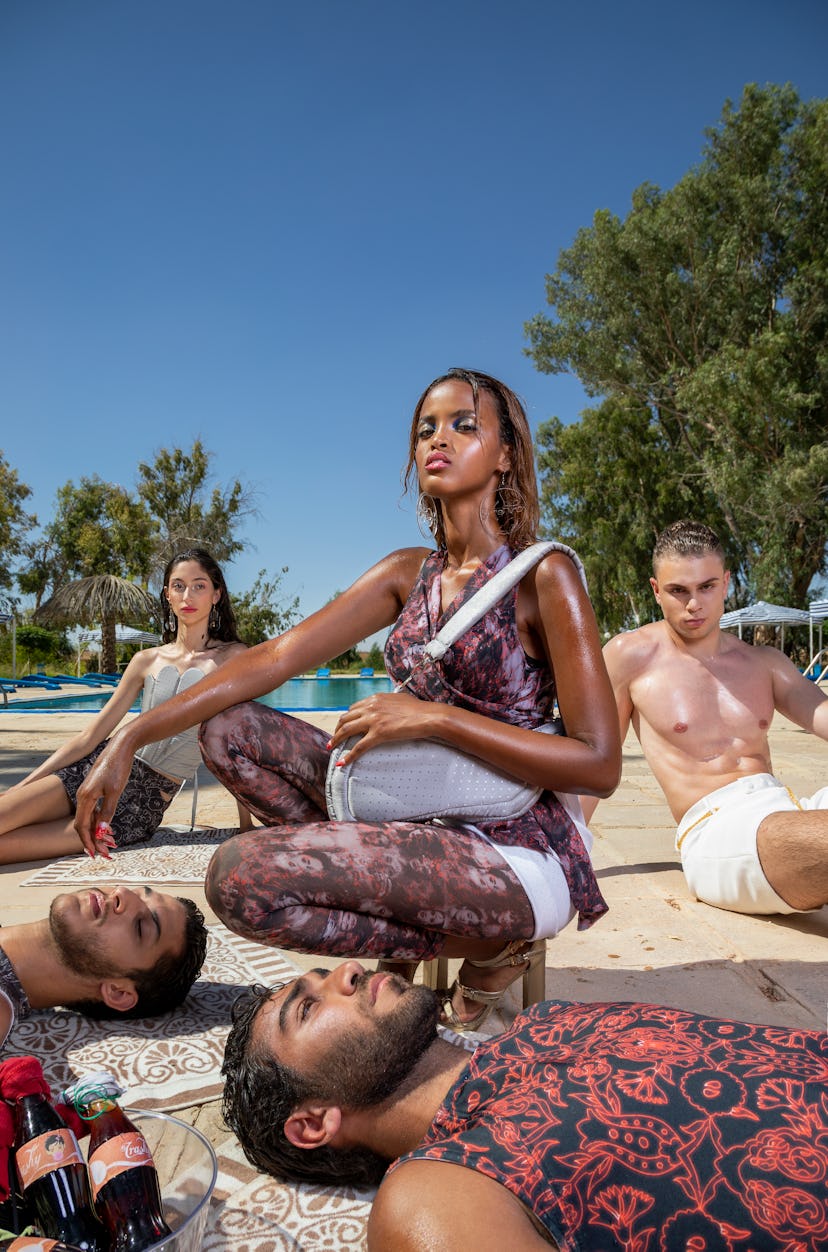In spring of 2021, Gaza and East Jerusalem saw their worst bout of violence in seven years, with thousands of injuries and a death toll that disproportionately affected Palestinians. The world witnessed the events with fury, watching the tragedy unfold during the Muslim Holy Month of Ramadan. The occupied land tucked alongside the coast of Palestine was again under attack—a site of conflict and battle since the early twentieth century. For decades, the ache of oppression has embedded itself in the psyche of the Palestinian people—studies prove Palestinians are at particularly high risk of experiencing anxiety and post-traumatic stress disorder as a result of political and societal discrimination.
In light of all this, a new class of Palestinian political activists, artists, and designers has emerged. This growing mass of politically minded collectives employ art to convey their love for their homeland—and preserve their heritage and history. This is their reclamation, one stitch at a time.
n n b y n n by Angham Khalil
Angham Khalil, the designer behind ready-to-wear brand n n b y n n, explores the struggle of attaining a cohesive identity under occupation. The brand’s decidedly unisex clothing, minimalist aesthetics, and subdued color palettes put forth an understated yet culturally potent vision of Palestinian fashion.
“What the Palestinian artist lacks is the possibility of communicating with the world, especially with the Arab world. The occupation wants to keep us small without a voice,” says Khalil.
Her latest collection portrays the fall of Palestine in the 1948 Civil War, during which an exodus of over 700,000 Palestinians took place. This flight from their homeland was the beginning of Palestinian displacement, says Khalil. She designed pieces with this exodus in mind, visualizing the trauma of the previous generation of Palestinians. Her work is an ode to the “Palestinian story” that deserves to be told.
tRASHY Clothing
Characterized by a self-proclaimed “camp” aesthetic, tRASHY Clothing is a satirical clothing brand spotlighting the Middle Eastern LGBTQ+ community and political activism. Shukri Lawrence and Omar Braika, co-creative directors of the brand, aim to reclaim Palestinian identity through their brand, subverting clothing that is usually considered crude or cheap.
“Our brand is a visual story of our lives, and as Palestinians our existence is political because to exist is to resist. With every piece, we cover an aspect of our story,” says Lawrence. “We try to use all aspects of a collection—such as tailoring, prints, campaigns, and casting—to convey each message.”
The designers painstakingly embed physical symbols of Palestinian symbols into their creations. For instance, their spring 2021 collection nods to the tough inspection checkpoints through which people must travel when entering or exiting Palestine through double-layered pants and tops, tailored to mirror the constant surveillance upon Palestinians. The idea was previously explored in tRASHY’s spring 2018 pieces, too: three years ago, their runway show had a built-in border allowing only one side of the audience to view the collection. The production was in line with their ethos: very tongue-in-cheek while striking a nerve.
Nöl Collective
Nöl Collective tells the stories of Palestine through its use of textiles, dyes, and prints. The collective engages with its homeland by centering nearly lost practices and art forms in every piece of clothing—think simple cotton fabrics printed with the fruits and plants of Palestinian land, and multihued striped pockets made with ancient embroidery techniques.
“Clothing is inherently political in every way,” says Yasmeen Mjalli, the collective’s creative director and founder. “It’s political in the way that the clothing of oppressed people is used to tell stories of historical and contemporary power dynamics.”
The production of the clothing itself embodies the anguish of border separation. “In many cases, we have not even been able to meet many of the producers we work with in person,” Mjalli explains. And yet, the collective works alongside “an intimate creative network of Palestinians—from fabric vendors in Nablus, to embroiderers in Gaza, to tailors in Ramallah.”
Meera Adnan
Meera Albaba, founder of the Meera Adnan label, makes intimate contemporary wear encompassing the geography and art of Palestine. She consistently seeks to amplify the voices of marginalized Palestinian people, and her garments seek to reclaim the Palestinian narrative. The silhouettes are romantic yet modern; her structured blazers and modest, straight-cut maxi-dresses, are made in a color palette reminiscent of the Palestinian landscape.
Albaba, who was raised in Saudi Arabia, visited the Gaza Strip at a young age, whereupon she witnessed her grandparents’ living in Gaza refugee camps.
“I always wanted to live ‘home’ although home wasn’t written on any modern-day map,” she says. Her clothing comes from a place of solidarity, she tells W, and with pride in being a refugee.
“I’d like for anyone who encounters my brand to understand the story I’m trying to tell through the garments, visuals, and everything I put out there,” she added. “I’d like the elements of romance, nostalgia, and drama to be beautifully and subtly transcended.”
This article was originally published on
